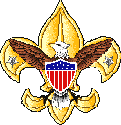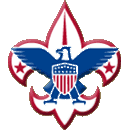| MERIT BADGES |
|
|
|
|
| Note: Eagle Required are in Italics |
"A"
American
Business
American Culture
American Heritage
American Labor
Animal Science
Archaeology
Archery
Architecture
Art
Astronomy
Athletics
Atomic Energy
Auto Mechanics
Aviation
"B"
Backpacking
Basketry
Bird Study
Bugling
"C"
Camping
Canoeing
Chemistry
Cinematography
Citizenship
Community*
Citizenship Nation*
Citizenship World*
Climbing
Coin Collecting
Collections
Communications*
Computers
Cooking
Crime Prevention
Cycling*
"D"
Dentistry
Disability Awareness
Dog Care
Drafting
"E"
Electricity
Electronics
Emergency
Preparedness**
Energy
Engineering
Entrepreneurship
Environmental
Science*
"F"
Family Life*
Farm Mechanics
Fingerprinting
Fire Safety
First Aid*
Fish & Wildlife Mgmt.
Fishing
Fly Fishing
Forestry
"G"
Gardening
Genealogy
Geology
Golf
Graphic Arts
"H"
Hiking
Home Repairs
Horsemanship
"I"
Indian Lore
Insect Studies
"J"
Journalism
"K"
"L"
Landscape Architecture
Law
Leatherwork
Lifesaving**
"M"
Mammal Study
Medicine
Metalwork
Model Design & Building
Motorboating
Music
"N"
Nature
"O"
Oceanography
Orienteering
"P"
Painting
Personal Fitness**
Personal Management*
Pets
Photography
Pioneering
Plant Science
Plumbing
Pottery
Public Health
Public Speaking
Pulp and Paper
"Q"
"R"
Radio
Railroading
Reading
Reptile & Amphibian Study
Rifle Shooting
Rowing
"S"
Safety
Salesmanship
Scholarship
Sculpture
Shotgun Shooting
Skating
Skiing
Small Boat Sailing
Soil & Water
Conservation
Space Exploration
Sports**
Stamp Collecting
Surveying
Swimming**
"T"
Textile
Theatre
Traffic Safety
Truck Transportation
"U"
"V"
Veterinary Medicine
"W"
Water Skiing
Weather
Whitewater
Wilderness Survival
Wood Carving
Woodwork
"X"
"Y"
"Z"
|
|
- List the major truck lines serving your town.
- Tell the importance of trucks in providing freight service to towns served by no other means. Name some towns in your area served only by trucks.
- Describe how trucks fit in with other forms of transportation.
- Describe the difference between the gasoline engine and the diesel engine that power trucks. List the advantages of each.
- Visit a truck terminal and do the following:
- Check the use of communications facilities. What means are used? How does a dispatcher control over-the-road trucks? How does the dispatcher control local trucks?
- Find out from the maintenance department the following: How many miles are engines run between overhauls? How do they get better tire life? How are breakdowns prevented? What maintenance work is done by the company? What work is done outside the company?
- Talk with a professional truck driver about safety. List five safe-driving rules he or she follows.
- Outline the general organization of a truck company. Describe what each department does.
- Do the following:
- List five jobs with trucking companies. Describe each.
- Talk with the safety director or driver supervisor about the requirements for becoming a professional truck driver.
- Name five governmental agencies that regulate trucking. Tell what they regulate.
- List five different kinds of trucks. Tell the service each gives.
- Assume that you are going to ship 100 pounds from your town to another by truck. Explain in writing how you would handle this shipment from your town to a place 500 miles away. Tell when the things are needed. List what truck lines are used. Tell how the shipment is insured for damage. Tell when it must be made if it is to arrive on time.
- Define the following terms:
- APU,
- bill of lading,
- common carrier,
- containerization,
- ETA,
- logbook,
- fifth wheel,
- OS&D,
- LTL.
|
||||||
Last Update May 15, 2023

.jpg)

 Truck Transportation
Truck Transportation